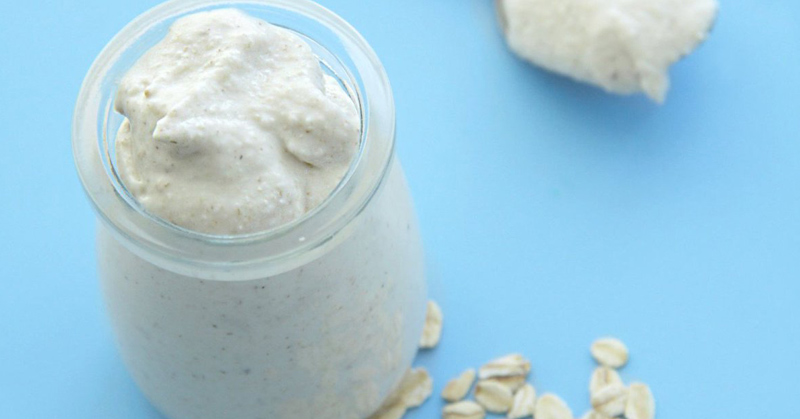If you love the tangy, creamy taste of yogurt but can’t (or won’t) handle the dairy, there is a simple, delicious solution to getting some probiotic goodness the non-dairy way: Coconut yogurt! With just 2 easy-to-find ingredients – probiotic culture and coconut milk – you’ll find yourself making this creamy, rich, probiotic dessert over and over again.
Follow the recipe below to whip up this decadent, non-dairy treat. You’ll love its tangy, coconuty flavour – and its amazing health benefits!
The Benefits of Probiotic, Non-Dairy Yogurt
The Positives of Probiotics

Yogurt, whether made with dairy or non-dairy milk, are thick, fermented milk products packed with high concentrations of good, gut-healthy probiotic bacteria, such as Lactobacillus acidophilus, as well as vitamins and minerals like Vitamin B1, B6, calcium, and magnesium. Put together, these components help regulate intestinal health, build stronger bones, and enhance immunity.
RELATED STORY:
Benefits associated with consumption of probiotic products, like yogurt, include:
- Lower blood pressure. Studies have confirmed that a diet that includes probiotic products has been associated with lower blood pressure and levels of triglycerides (fat) in the bloodstream.
- Lower cholesterol and fat levels. Consumption of probiotic products has been shown to improve dyslipidemia – high cholesterol and/or fat levels – in people with diabetes.
- Well regulated blood sugar levels. Probiotic cultures were shown to improve management of blood sugar levels.
- Lower body weight and/or gain. Those who had a steady diet of probiotic products tended to have a lower body mass index (BMI) – a measure of body weight compared to body height – as well as less weight gain, lower body fat, and smaller waist circumference.
The Notable Pluses of Non-Dairy Products
Non-dairy products with probiotic cultures could also have advantages over their dairy counterparts, as they do not contain potentially problematic components and/or health risks associated dairy foods.
Indeed, dairy foods can cause health issues in many individuals. Perhaps most notably, dairy products can cause gut irritation in people with irritable bowel syndrome (IBS), cow-milk allergy, lactose intolerance, or dairy sensitivity in the form of bloating, constipation, acne, dry skin, heartburn, food cravings, and inflammation. Casein, a milk protein, has also been found to cause inflammation in people with gluten sensitivity.
Consuming dairy products could increase the risk of developing deadly diseases as well. Indeed, dairy intake has been identified as possible developmental factors for cardiovascular disease, diabetes, and metabolic ailments, perhaps because of the high sugar content in milk and milk products. Steroid hormones in milk products have also been associated with risk factors for various cancers. In addition, women who consume more than 2 servings of low-fat dairy products a day were found to have higher risk of anovulatory infertility – a condition arising from malfunctioning ovaries.
In other words, consuming non-dairy milk alternatives instead of dairy products could help reduce the risks and/or complications associated with a diet of dairy products.
The Outstanding Competencies of Coconuts (and Oats)
The health benefits of the ingredients in non-dairy yogurt will, of course, transfer to the final product. In the case of our 2-ingredient coconut yogurt, we will be benefitting not only from its probiotic bacterial cultures but also the goodness of coconuts and oats (which we recommend as a topping for this recipe).

Coconut – especially the medium-chain triglycerides (MCT) fats within coconut milk – has been associated with health benefits such as:
- Reduced risk of Alzheimer’s disease. High sugar intake has been associated with severe neurological diseases, like Alzheimer’s. The MCT in coconut milk, however, can act as a “secondary fuel source” for the brain by fostering the creation of fuel-like ketones instead of glucose. Indeed, higher ketone levels have been associated with improved neurological functioning in people with Alzheimer’s.
- Better gut health. Coconut milk contains lauric acid, which has been found to kill bad bacteria, like the pneumonia-causing Staphylococcus aureus.
- Faster weight loss. The body may expend more energy, feel full faster, and control weight better when on a diet containing MCT fats instead of long-chain triglycerides (LCT), as found in olive oil.
- Lower cholesterol. Coconut milk may raise HDL (“good”) cholesterol and lower total and LDL cholesterol levels.
RELATED STORY:

The benefits of oats include:
- Reduced risk of coronary artery disease. Whole-oat sources of soluble fiber were found to reduce the risk of coronary heart disease by lowering total and “bad” LDL cholesterol levels without seriously affecting the level of “good” HDL cholesterol within the body. Daily consumption of 3 portions or more of whole-grain foods were found to reduce risk of cardiovascular disease and high blood pressure in middle-aged people.
- Reduced risk of colorectal cancer. A high-fiber diet has been associated with lower risk of developing colorectal cancer.
- Reduced risk of obesity and chronic disease. Whole-oat fibers were found to provide better nutrient intake, diet quality, and reduced risk for fat gain and obesity in children.
So without further ado, here are instructions on how to make your own non-dairy yogurt!
How to Make Non-Dairy Yogurt – of Any Kind!
Making non-dairy yogurt consists most generally of these 3 steps:
- Choose non-dairy milk, such as coconut, hemp, or rice milk.
- Add a thickener (if desired) to make your final product as thick and creamy as you would like.
- Add probiotic bacterial culture, whether from a yogurt-making kit or probiotic capsule of your choice.
See here for more precise measurements for different types of non-dairy milk, thickener, and cultures. The possibilities are endless!
But here, we introduce our favourite (and easiest) variation yet – the thick and creamy 2-ingredient coconut yogurt.
Recipe: Thick and Creamy 2-Ingredient Coconut Yogurt
From our friends at Minimalist Baker
Serves: 1.5 cups total
Prep time: 48 hours
Ingredients
- 2 high-quality probiotic capsules
- 1 14-ounce (414ml) can of smooth, creamy full-fat coconut milk (containing guar gum, if possible)
- NOTE: The milk should not be grainy or chunky.
- (Optional) 100g or 1 handful of oats
Instructions
- Vigorously shake the can of coconut milk. Then pour the coconut milk into a clean glass jar or bowl.
- Empty the contents of the probiotic capsules into the jar/bowl. Use a wooden spoon to mix the contents together.
- Cover the top of the jar/bowl with a cheesecloth, and seal tight with a rubber band.
- Leave the jar/bowl at a warm temperature (75 degrees F / 23 C or so). Wait 24-48 hours, as desired. The warmer it is and the longer you wait, the thicker and tangier the yogurt will be.
- Refrigerate the yogurt for one hour to thicken. If you use coconut milk that does not contain guar gum, the yogurt might have separated into two layers: Creamy yogurt on top, with water underneath. In this case, simply scoop out the creamy layer.
- Sprinkle oats on top and serve.
The yogurt will keep in the refrigerator for 4-7 days.
Feel free to jazz up your yogurt with other add-ons, like:
- Fruits and berries. Try adding melons or classic berries, like blackberries, strawberries, and blueberries, to sweeten your yogurt. You might also like citrus fruits, like oranges and lemons, or tropical fruits, like bananas, mangoes, and pineapples.
- Cocoa nibs and/or dark chocolate. Use unsweetened or semi-sweetened cocoa chunks to give the yogurt a chocolatey twist.
- Crunchy toppings. Sunflower, chia, or pumpkin seeds, as well as dried coconut flakes and puffed rice, will add a fun, satisfying chew to your yogurt.
- Spices. Try adding a dash of cinnamon, cloves, nutmeg, peppermint, or vanilla for a healthy, aromatic spin.











